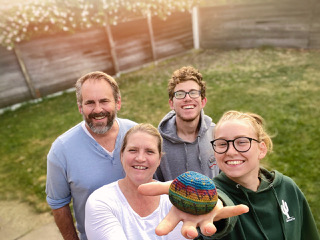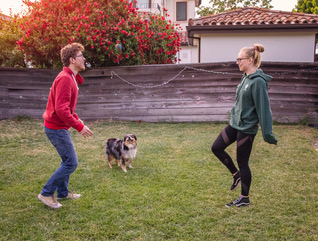Stories Inspire Virtue | COVD-19 Conversations with Pat & Tammy McLeod
April 30, 2020To Place & Practice | COVID-19 Conversations with Pat & Tammy McLeod
May 5, 2020Resiliency & Rhythm
By Ron Sanders, Campus Minister with Cru at Stanford University, Associate Faculty in Christian Ethics at Fuller Theological Seminary
“I assume that persistent distress is not good for any individual or family, but that in spite of continuing ambiguity, people have the potential to recover and thrive by learning how to manage the stress” (Pauline Boss, Ambiguous Loss, Loc 205/1483).

I have been teaching a class this week—wonderful people; humble; kind. If you are experiencing zoom fatigue, just imagine having to be in class for 5 hours. This class is a part of a required curriculum for the ongoing development of our Cru staff–people who spend most of their days doing their best to “love their neighbors as themselves,” talk to people who have questions about faith, and help people grow spiritually. It is an ethics class, so we are having conversations about difficult topics: the intersection of Christianity and race, sexuality, and politics. These are important topics, but they are draining. I think a lot about them as both a Christian and as an ethics professor.
One of my students asked something like, “where do you find quiet space where your mind can rest?” We were talking about the benefits and the problems with “cognitive closure.” One of the benefits of cognitive closure is that it gives your mind space to rest and process information that you’ve taken in—this is good for our mental health in normal circumstances. One of the problems with cognitive closure is that if we try to avoid mental dissonance all the time, we won’t grow—we will just settle into group think and confirmation bias on all of these important issues.
We were talking about the positive benefits of mental rest and it made me think about the lack of cognitive closure surrounding this global pandemic. Covid-19 has created ambiguity. There is so much more information to process—a half-hour news cast is almost exclusively about the virus and its implications. We have to readjust the normal rhythms of our life—this takes mental energy. Our house is full of people all the time—we are constantly navigating how we do relationships in this close of proximity. These are not normal circumstances.

One of the ways that we are trying to give our minds a rest and help with our family’s resiliency is to insert a few new rhythms into our daily schedule. We each have our responsibilities during the day…I teach starting at 8.00 am, Bonnie works out and then starts work around 9.00 am, the kids have their school responsibilities. But each day at around 6.00 pm we have dinner together. I cook…it helps my mind relax; it’s complicated enough that I can’t think about other things. After dinner, we walk across the street to the school and we play hackey-sack. We have never played hackey-sack as a family before Covid-19. We try to increase the number of “hacks” we get in a row on Monday of each week—our goal is 8 this week. We warm up by kicking it around, and then we focus. We don’t stop until we reach our goal (sheltering in place better not last too much longer or we might not make our goal). People walk by, they try not to laugh. We have fun.
This is one of the ways that we are trying to build resiliency together…to manage the barrage of information that we are getting daily, to handle the ambiguity of the realities of a worldwide contagion, and to navigate the adjustments that we have had to make from our “normal lives.” We are trying to add a new rhythm to our lives that helps us let our minds rest. We learned this from the idea of the “sabbath.” Six days God created and then on the 7th day he rested. A rhythm of work and rest (play). Its 7.12 pm. I have had dinner and my family is waiting for me…
Photography by Bonnie Sanders
